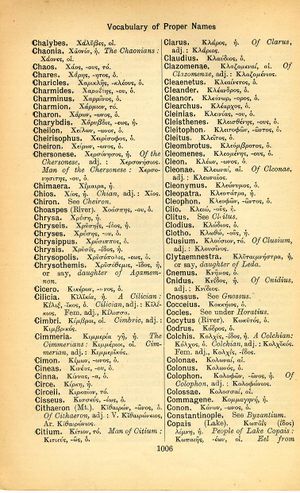Codrus: Difference between revisions
ἐν οἰκίᾳ τυφλῶν καὶ ὁ νυκτάλωψ ὀξυδερκής → even the day-blind is sharp-eyed in a blind house | among the blind, the one-eyed man is king
m (Text replacement - "link={{" to "link={{") |
m (Text replacement - "}}]]" to "}}]]") |
||
| Line 1: | Line 1: | ||
{{WoodhouseENELnames | {{WoodhouseENELnames | ||
|Text=[[File:woodhouse_1006.jpg|thumb | |Text=[[File:woodhouse_1006.jpg|thumb | ||
|link={{filepath:woodhouse_1006.jpg | |link={{filepath:woodhouse_1006.jpg}}]][[Κόδρος]], ὁ. | ||
}} | }} | ||
{{Lewis | {{Lewis | ||
Revision as of 10:10, 15 August 2017
English > Greek (Woodhouse)
Κόδρος, ὁ.
Latin > English (Lewis & Short)
Cōdrus: i, m., = Κόδρος.
I The last Athenian king, who voluntarily devoted himself to death in order to obtain for his people victory over the Spartans, Cic. Tusc. 1, 48, 116; id. Fin. 5, 22, 62; id. N. D. 3, 19, 49; Hor. C. 3, 19, 2; Just. 2, 6, 19; Vell. 1, 2; Val. Max. 5, 6, 1.—
II A wretched poet, hostile to Virgil, Verg. E. 5, 11; 7, 22; Juv. 1, 2; 3, 203; 3, 208; cf. Weich. Poett. Latt. Rell. p. 402 sq.
Latin > French (Gaffiot 2016)
Codrus,¹⁴ ī, m.,
1 roi d’Athènes : Hor. O. 3, 19, 2
2 nom d’un berger : Virg. B. 5, 11
3 nom d’un poète : Juv. 3, 203.
Latin > German (Georges)
Codrus, ī, m. (Κόδρος), I) der letzte König in Athen, der im Kriege mit den Spartanern sich freiwillig für den Staat dem Tode weihte, weil er wußte, daß sein Tod den Feinden verderblich sein werde, Cic. Tusc. 1, 116 u.a. – II) ein dem Vergil befreundeter Dichter, Verg. ecl. 5, 11 u.a.

